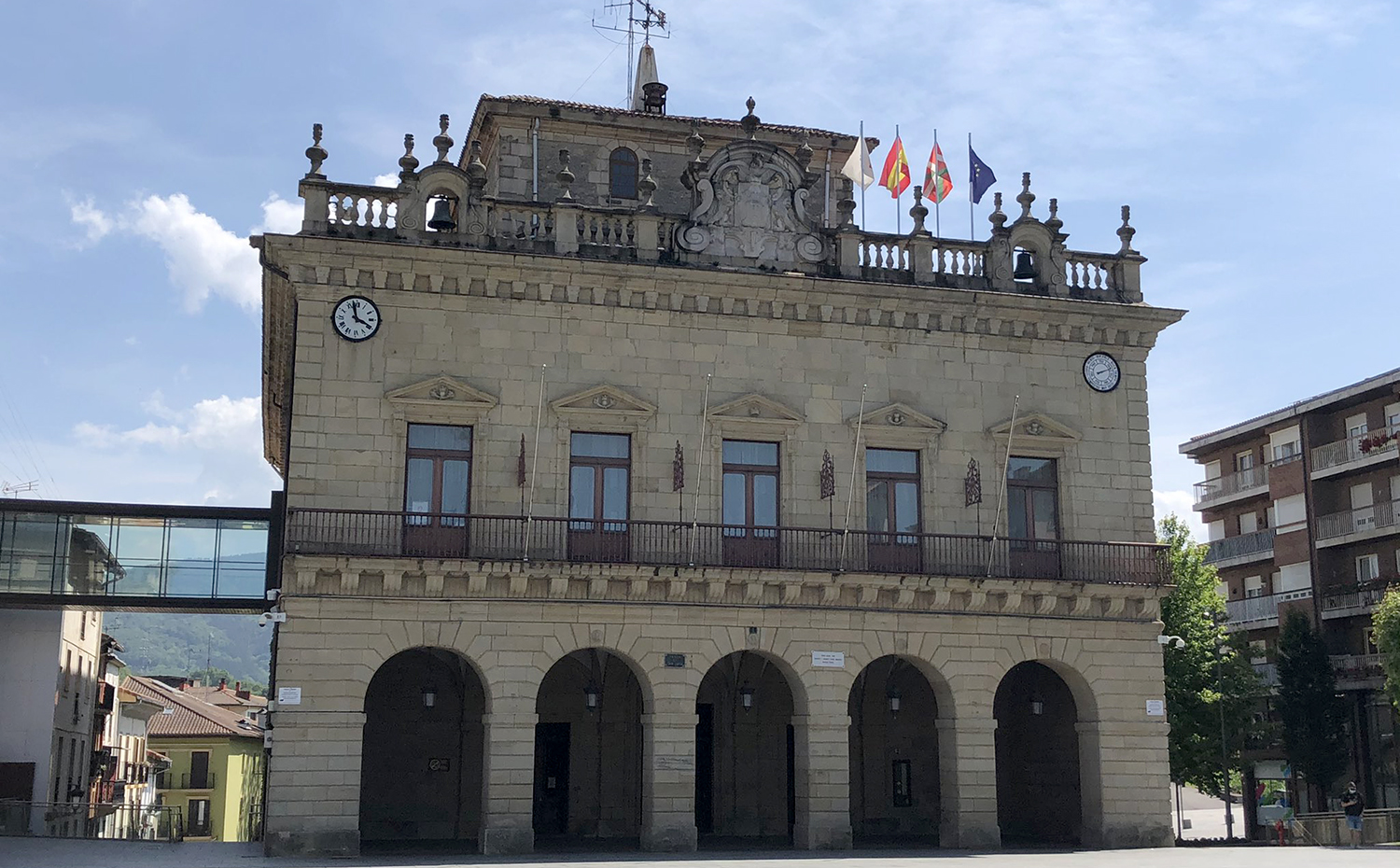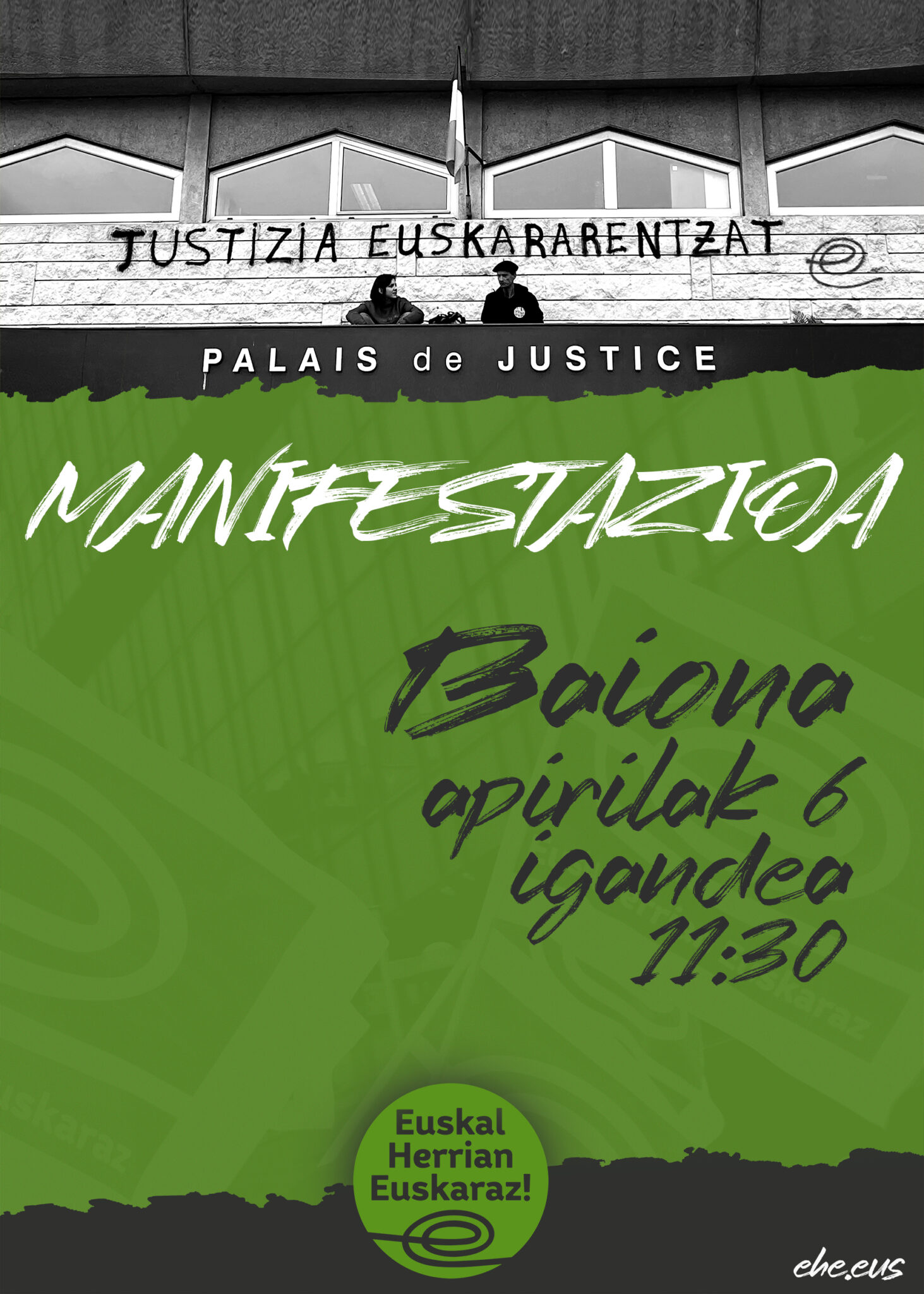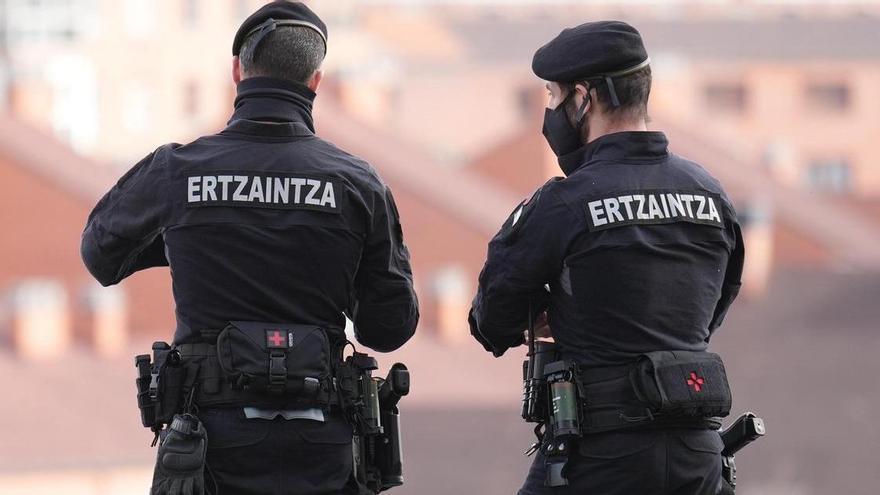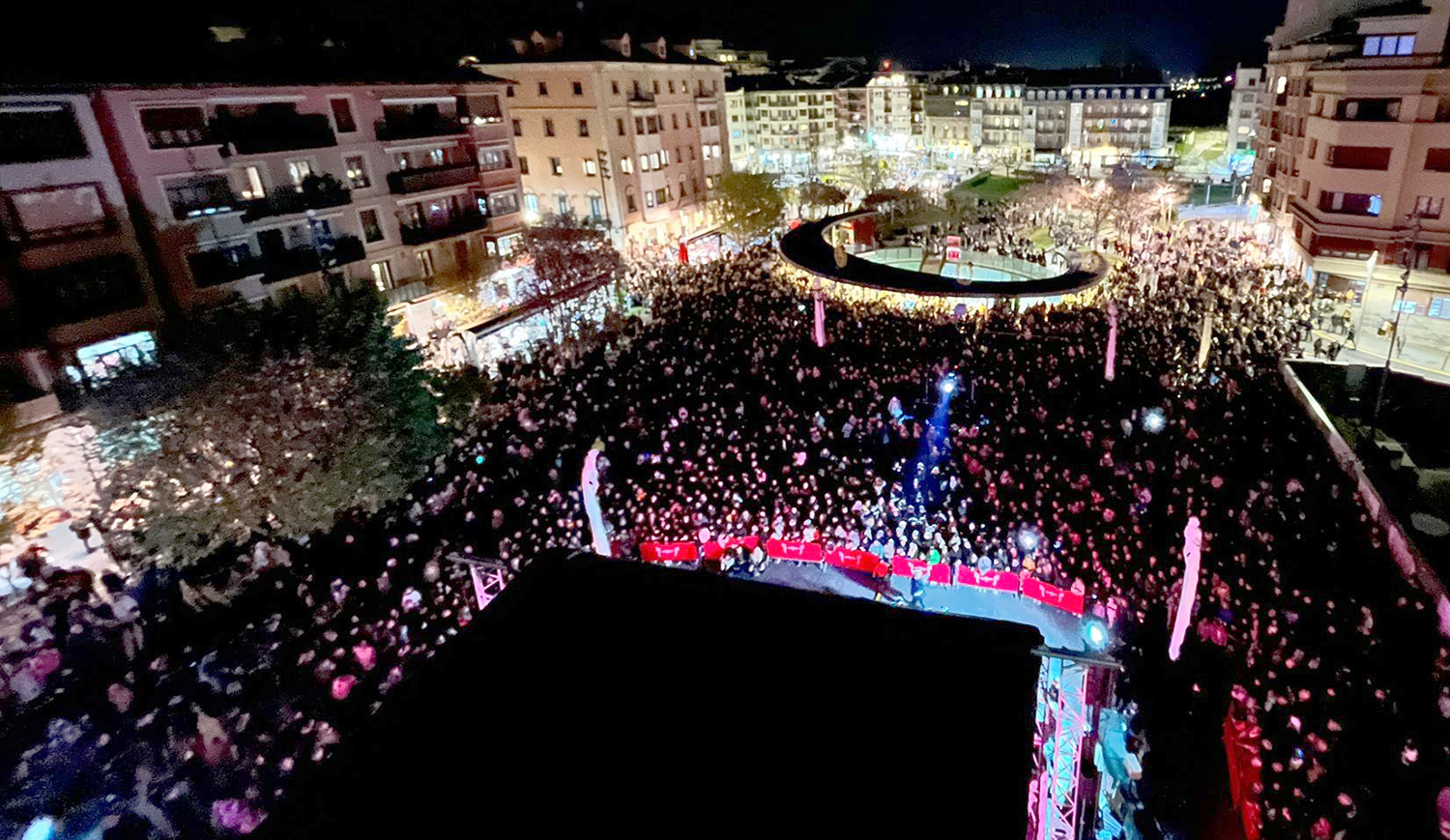"As long as we are not guaranteed linguistic rights, there will be a collision"
- Arkaitz Zarraga and Eneka Alvarez. We have two Basques who have found themselves in the midst of two media turbulence. Both have been violated by the public administration’s linguistic rights and both have been fined in elegant Spanish. They are the tip of the iceberg, two cases that have attracted attention, in the wide range of attacks against the Basques that occur invisibly and undenounced in daily life.
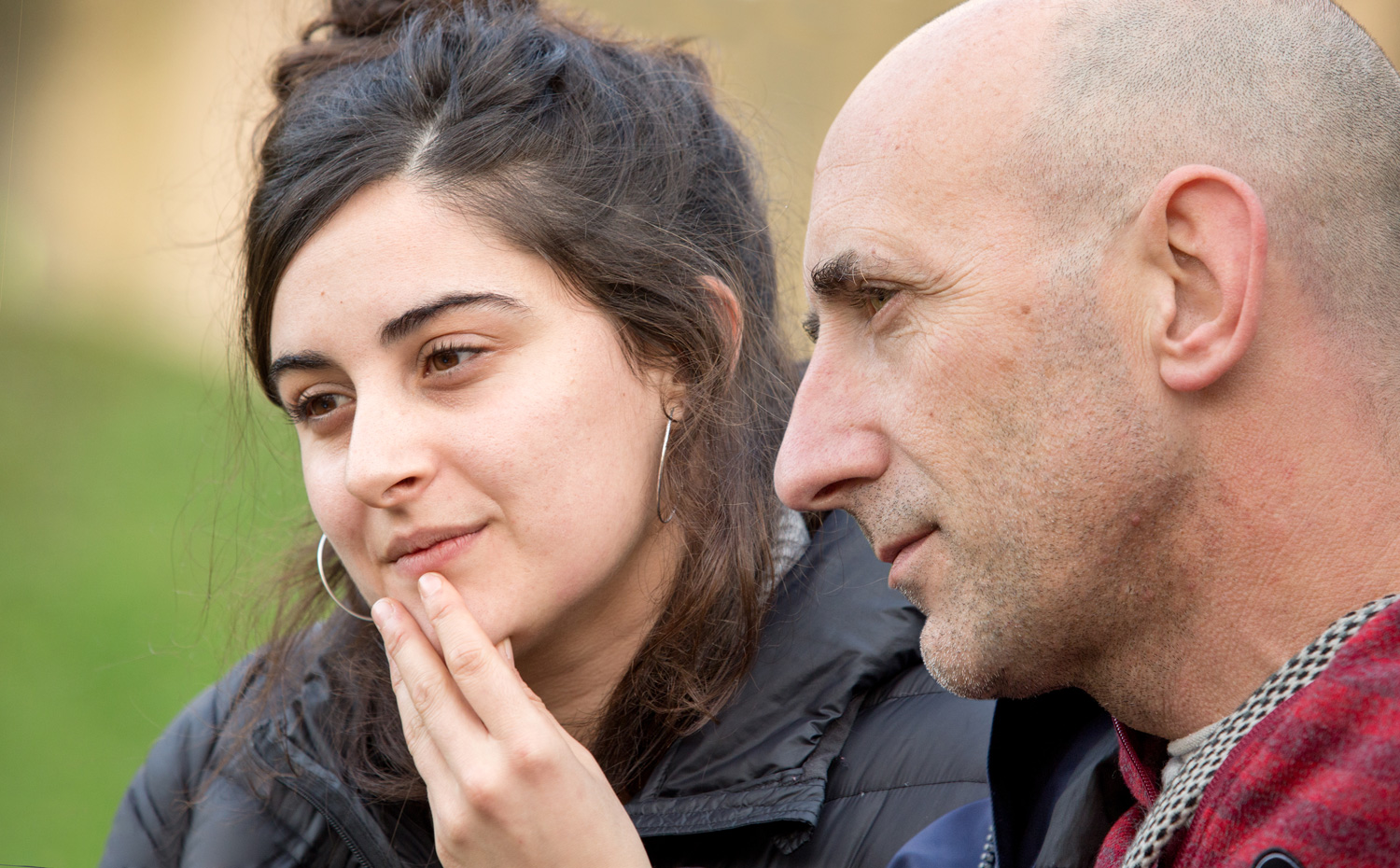
You, Arkaitz, a municipal police officer in Bilbao, besides the traffic fine, imposed a second sanction for disrespect for having asked you to speak in Basque. How do you remember it?
A. Zarraga: I caught it with surprise. The parties were finished and the traffic was closed, I took the road used by the members of Bilboko Konpartsak and the municipal workers with the car. When I was stopped by the municipal police, I thought I was wrong and I hadn't realized I was compartmentalized. I showed him permission, but he proudly said to me, “Haven’t you seen that you’ve passed over a stroke of zebras?” I answered that we had all done it every day, the dealers, the comparisons, the cleaners ... Then, anyway, I added “forgiveness, I am speaking in Basque and I am speaking in Basque please.” There were four municipal guards, I thought if he didn't know he could be in contact with another one. He then vehemently told me, “I have the right to speak to you in either of the two official languages.” It is an argument that I have heard many times, I work on that issue and therefore I told him no. In order to forgive, but in this case I was the citizen who was in contact with the administration and that it has to be the guarantor of rights. “Your right is not above mine, you must guarantee mine.” Then, giving me all the authority he said: Park the car. That sense of frustration and helplessness that occurs there is hard to manage. It is true that Euskaldunes are bilingual and that the easiest way is to do it in Spanish, but I endured it.
What conclusion did you draw?
A. Zarraga: On the one hand, people are aware of what is happening, because I have felt great support. People believe and the Basques know that that is what happens. On the other hand, there are people who do not accept that the Basques have a right. In this case it is a police officer, perhaps it is a significant feature, I probably went through the Basque Country, as he understood it to me. We are given the right to know the language, but not to use it. It gives the impression that the use of Euskera is a secondary right. Sometimes it's not accepted and it's thrown at him. Subsequently, the authorities above them protect them, otherwise they would not have acted in that way.
Arkaitz, the subject came to the City Hall and you had a tough answer.
A. Zarraga: The response of the Bilbao City Hall was very painful. On the one hand, they said that I started in Spanish and then used the Basque to oppose the municipal police. In addition, they said I played this way because I was a woman, and that does harm. Seeing how the situation of women is, let the City Council of Bilbao, which does a little bit of gender policy, say so, is tough. It hurt me, it surprised me a lot. However, as from the Basque sphere, I also received support from the feminist movement. “It is not legitimate to use feminism to oppose, and we know it has not been so,” he replied. Maybe because I work in Euskera, you know that I'm never going to speak Spanish with a municipal police force, and that brings them to the fore.
Eneka, something like that has just happened to you. You claimed the right to speak in Basque with the Ertzaintza, they identified you and now you have been condemned by the Moldovan Law. Can you tell how the discussion started?
R. Álvarez: At the end of the press conference convened by ERNAI, many people began to identify themselves, including journalists they were recording, and many others. Soon, when identity documents were being returned, an agent threatened one of the organization ' s members with a crime of disobedience. This person ironistically answered him that it would be “a serious disobedience” to be listening at a press conference, and the ertzaina replied with contempt that he did not care what he was saying, because he did not understand him. I got angry then and I told him I could say the same thing without losing respect. He began to ask me what he had said, I repeated it, and he replied that he did not understand me. After that, the video starts. I said, “You’ve failed” and he “I haven’t missed.” Then he asked me for the documentation and the salsa started.
They report that they are not going to pay the fine. Why?
R. Álvarez: I am accused of trying to identify the person responsible for the press conference and that I had put myself between that person and the agents, preventing the person responsible from being identified. This is belied by the video, in which a person appears in the middle of the debate saying that he has already been identified as responsible for the discussion. They violated my rights and accused me of falsehood. It seems to us to be a double punishment for the size of the video, which has a point of revenge. It is also noteworthy that the letter has been sent to me in full in Spanish. We have decided not to pay the fine and to appeal.
A. Zarraga: I was also sent the fine in full in Spanish.
R. Álvarez: It is a very clear expression of power. “Here things work like this,” as if they told us. It has a provocation point, another way of showing who commands.
For the umpteenth time, if any, the Ertzaintza apologized in July. What value does it have?
R. Álvarez: This forgiveness did not come by his own will. I had previously lodged a complaint with the Centre for Linguistic Rights. The case was heard and forgiveness came to the Observatory. Although they have my data, they have not contacted me. This forgiveness seemed at first to wash hands, it was a forgiveness to reconcile. We're not used to it.
A. Zarraga: I used it in Bilbao. “At least they have been asked for forgiveness.”
R. Álvarez: Then came the fine. In addition, these days we've learned that two Ertzaines that I had a discussion deny that they have asked for forgiveness. It is therefore a role that has no value. Something they haven't done very well.

Both are professors of the Basque Country.
A. Zarraga: We have a special conscience. In my case, the agent who had found me had gone through the Basque Country. We have students of this kind who are looking for the linguistic profile, and once they have achieved that they don't care anything else, they have work and it's over. This system clearly demonstrates its failure. The administration cannot be belarriprest, it is not enough to have a level of understanding. I want you to have a full relationship with me in Basque. Furthermore, they have to know that there are some linguistic rights and that they have to respect them, that I decide in which language I am acting. That has become apparent.
R. Álvarez: These cases are not isolated, they have been echoed for several reasons. We are well aware of our rights. However, this occurs on a daily basis. The point is that it is always up to the Basque to insist, to remember the rights... for your part, to ask for strength, for empowerment, because it is hard work. However, I encourage everyone to denounce the violations and, as long as they do not guarantee us the rights, this clash will be there.
What do the students of your Basque Country say?
A. Zarraga: Some people said, "Joe, how radical are you?" I explained to them why I do it, why I'm a professor of Euskera. That is my right and your duty to guarantee it. If the agent does not know Basque, bring another. There were four, one who had been my disciple. When the guy realized I was, he was embarrassed and disappeared. I explained to them that it wasn't just knowing the language. Many students are looking for the linguistic profile, now they want to do it, but they have to know that in their work they will also have the need to know Basque. If someone comes to you in Euskera, which is a matter of respect that answers like this, let's call it in a store. In the administration, on the contrary, it is a duty to respond in that way.
R. Álvarez: In my case, they knew it through the video. When I got to work, everybody was excited. I told them what had happened and most responded that the agents had no difficulty in answering in Euskera. It was the first time that such a clash was seen in general. Many, so far, linguistic rights and violations have become bizarre. They were tied up with me, and in general, they were shocked. However, I also have students of that profile that Arkaitz mentioned. In the Basque Country I have heard barbarities, for example, “I will take the title out and then throw it away.” Everything fails in something.
A. Zarraga: This typology of students thinks that language is imposed on them. In this case you have seen that the tax is the other thing. The Basques know the two, and even if we choose the Basque, they impose the other. However, there are also people who, despite coming with that profile, come to know, to like, to discover and to love our world. They come with an instrumental motivation and end with an integrational motivation.
R. Álvarez: Some in this process of language learning discover a whole world. Those who make the most effort to integrate into it, hallucinate it and the more will they have to discover it, the learning process is also more joyful, better and more motivating. There's everything, students thousand, reasons thousand.
“Wanting to live in Basque is always a source of conflict,” Arkaitz said in an interview at Bizkaiko Hitza. In this Basque Country 2019 is Euskahalduna more likely to receive a fine?
"It seems that all the problems are solved and these kinds of facts prove not. Today's language policies are sterile, they need a turn."
Eneka Alvarez
R. Álvarez: It seems that all the problems are resolved and these kinds of facts prove that no. Today's language policies are sterile, they need a spin. Not only to guarantee the language in which citizenship wants to be attended, but also to address all outstanding works of normalization, such as the Euskaldunization of the world of work or administration. It needs a big spin.
A. Zarraga: Paper holds it all, we have to move to efficiency. Here language planning covers all areas, whether it be the world of work, sport, leisure, education... but to do so we must put in place means and take effective measures. Sometimes they will be incentive and motivating measures; sometimes they are the ones that impose compulsion. That is how the steps are taken. We have been fined and, in view of this, the Basques may think twice before claiming their rights. If the fine were applied to the person who violated the right, things would start to change.
Arkaitz, in your case a support concentration was not organized, Eneka, in your case. Have we not felt very reluctant to answer?
A. Zarraga: Yes. My environment is Bilbao and although it is the municipality where there are the most Euskaldunes, we are quite scattered. The community is not very compacted and the feeling is shy. We think that in order to mobilize, we have to walk above a bunch of people. I believe that since we are young we have to start and we are going to strengthen it, but yes, we have to take responsibility. We are Basques and that brings consequences. We have to demonstrate publicly that Euskera is not a folkloric issue, it is a matter of rights and nature.
Under the motto Eneka, no unanswered aggression, Ernai and EHE have organised a response. Why?
R. Álvarez: Such attacks are not isolated, they occur many times and we are always full of uncertainty in this response. If we have learned something in recent years, we must denounce the attacks, make them public and respond to them. In order to socialize the problem, activate the community and guarantee our rights, it is essential to go out into the street, show that our rights are systematically violated.
"If the fine were imposed on anyone who violated the right, things would start to change," he added.
Arkaitz Zarraga
A Zarraga: I with Garabide soil go to Colombia and the indigenous communities are very surprised by the process that we have carried out. We've done something terrible, it's a show in the world, but today it seems like it's done. If they have done all that the elderly have done, it is up to us to respond. In the face of such situations, if not, what does our generation have to do? To waste what little has been achieved? This road is not finished at all, our language is in danger, like many others in the world, and young people also have to see that we have to fight. The linguistic struggle must be maintained.
R. Álvarez: The impression that everything is done is widespread, especially in the CAV. Much progress has been made, but if we extend the perspective, in addition to the complete vision of Euskal Herria, taking into account the different areas of people's lives, it can be seen that what is missing is terrible. We have to turn around that, there is a lot to do, we have to internalize that the road is going to be long, there is nothing finished here. We are a minority and oppressed language.

Arkaitz, although you have been claiming for years, Bilbao has no Basque ordinance. They say it's not necessary.
A. Zarraga: It is now Pamplona that has approved it. It shows how the authorities in Bilbao take Euskera as something folkloric. We have always denounced it. We have ordinances on issues like noise, the use of public space, why not language? Because that would give him another status. The Basques need the legal bases, even if those above them are not the ones we would like. Today, Spanish is compulsory and Basque is optional. Public employees also know that they have no such obligation above, but we Basques need them.
The attacks on Euskaldunes through the Basque Country are strongly opposed and in Basque Country there are thousands of Euskaltzales that are not organized. We have just passed Euskaraldia, in which thousands of people have participated. Journalist Martin Kitto ironically said that the Fine had now been initiated. How do you see the struggle of the Basque movement?
"We have to take responsibility, we are Basques and that has consequences," he added.
Arkaitz Zarraga
A. Zarraga: In the news, I wrote an article on this topic. Euskaraldia has been an example with its ups and downs, but it affects the psychosocial approach. There are other areas that are not taken as seriously, such as language rights or the education system, that do not use it correctly. This requires drastic measures and resources. We do great media campaigns, we're very adept at that, but then we went without analyzing other things. For example, we should look at the role of Euskaltegis and what they have today. We must carry out a thorough analysis and take effective and thoughtful measures. At the university level there are numerous studies, but then they have no reflection in our daily lives, or the tools of Basque cultural activity are not adapted to it. We need a serious adaptation process.
R. Álvarez: It looks like something's moving. There are a lot of people, but atomized, we lack a powerful meeting. The need for a new speech has also been stressed in recent times. There's a click or something missing: activation, compaction, new goals, sort everything out, deciding where we're going to go in this decade, where we want to go next time, how we're going to do it, think a little bit and move on.
In what cases did I look forward?
"We have to internalize that the road is going to be long, there's nothing finished. We are a minority and oppressed language."
Eneka Alvarez
A. Zarraga: We have resorted to the two fines. Traffic has no way, if you put a fine on me you will not be able to use it from now on, and that will be a real logistical barrier at the Bilbao festivities, because it is a natural way out of the txoznas. The other fine is legally very clear, I told him in Euskera “puta chula,” says the Municipal Police, and I want her to explain to me how that is said in Euskera. I will also teach the students. I think they're not going to come down from the donkey, they're going to go on and they're going to fine me. Even if it’s just for activation, we’ll have a party to take money and take money to try to shake off the Basque Country in Bilbao.
R. Álvarez: We will bring an appeal and see what remains. This should be used to encourage people to report. It has to be seen that there is a community, that there is support and that we are going to denounce these aggressions and violations. “It hasn’t happened to you alone, it’s very common, and behind you are people to take care of you, protect you, pay collectively if fines come, to do whatever you can along the way,” is the message. Let all of this serve to make the following feel the strength.
A. Zarraga: It is significant that the Centre receives complaints, but very few have been received. We lack awareness to maintain our rights and denounce where necessary.
R. Álvarez: With my incidence I have seen that people are still not aware of the rights that we have as speakers. I was asked what to do in that case. Maybe we have to start seriously spreading what our rights are, what to do when they violate us, etc. You have to take it seriously, it's time.
Arkaitz Zarraga: Bilbao, 1972 She is currently director of the Basauri Municipal Euskaltegi. He holds a degree in Basque Philology, Sociolinguistics and Language Teaching. He is a Glottodidactic advisor at the UEU and is a member of the Hau Pittu Hau comparison.
Eneka Alvarez Loidi: San Sebastián, 1994. He is a professor in the Basque Country. He's studied Basque philology and then he's trained in sociolinguistics. He is a member of ERNAI.
Don't make a fuss, don't confront, don't victimize... and obey. As oppressed subjects, in this case as Basques, we talk, how many times have we had to listen to them? Ironically, two years ago, at the Euskalale Independentiston Meeting, Esne Arzallus said: "We have arrived here,... [+]
Euskal Herrian Euskarazek manifestazioa deitu du apirilaren 6rako, 11n EHEko bi kide epaituko dituztelako. Hiriburuetatik autobusak antolatzen ari dira. Bi helburu bete nahi dituzte, batetik, epaituak izango diren bi kideei babesa erakustea, eta bestetik, euskararentzat justizia... [+]
ELA sindikatuak azaldu duenez, azken Lan Eskaintza Publikoaren oinarrien arabera, Ertzaintzarako eskainitako lanpostuen %20ak eta Udaltzaingoaren %30ak ez daukate euskara-eskakizunik. Gasteizen, adibidez, udaltzain-lanpostuen erdietan, 24tan, ez dago euskara-eskakizunik.
Ba al dakizue frantses batzuk harritu egiten direla mugaren alde honetan ere euskaldunak bagaudela jakitean? Ba bai, harrigarria bada ere, behin, Donostian, frantses batzuei entzun nien sinetsi ezinik beren buruari galdetzen: “Saint-Sébastien est au Pays... [+]
"No entiendo, en castellano por favor" eta gisakoak ohikoak dira eskolako guraso Whatsapp taldeetan, baina Irungo Txingudi ikastola publikoan euskara hutsean aritzeko modu erraz eta eraginkorra dute, behar duenarentzat itzulpen sistema berehalakoa ahalbidetuta.
Gabonetako argiak pizteko ekitaldia espainolez egin izanak, Irungo euskaldunak haserretzeaz harago, Aski Da! mugimendua abiatu zuen: herriko 40 elkarteren indarrak batuta, Irungo udal gobernuarekin bildu dira orain, alkatea eta Euskara zinegotzia tarteko, herriko eragileak... [+]









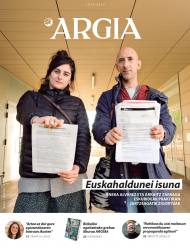




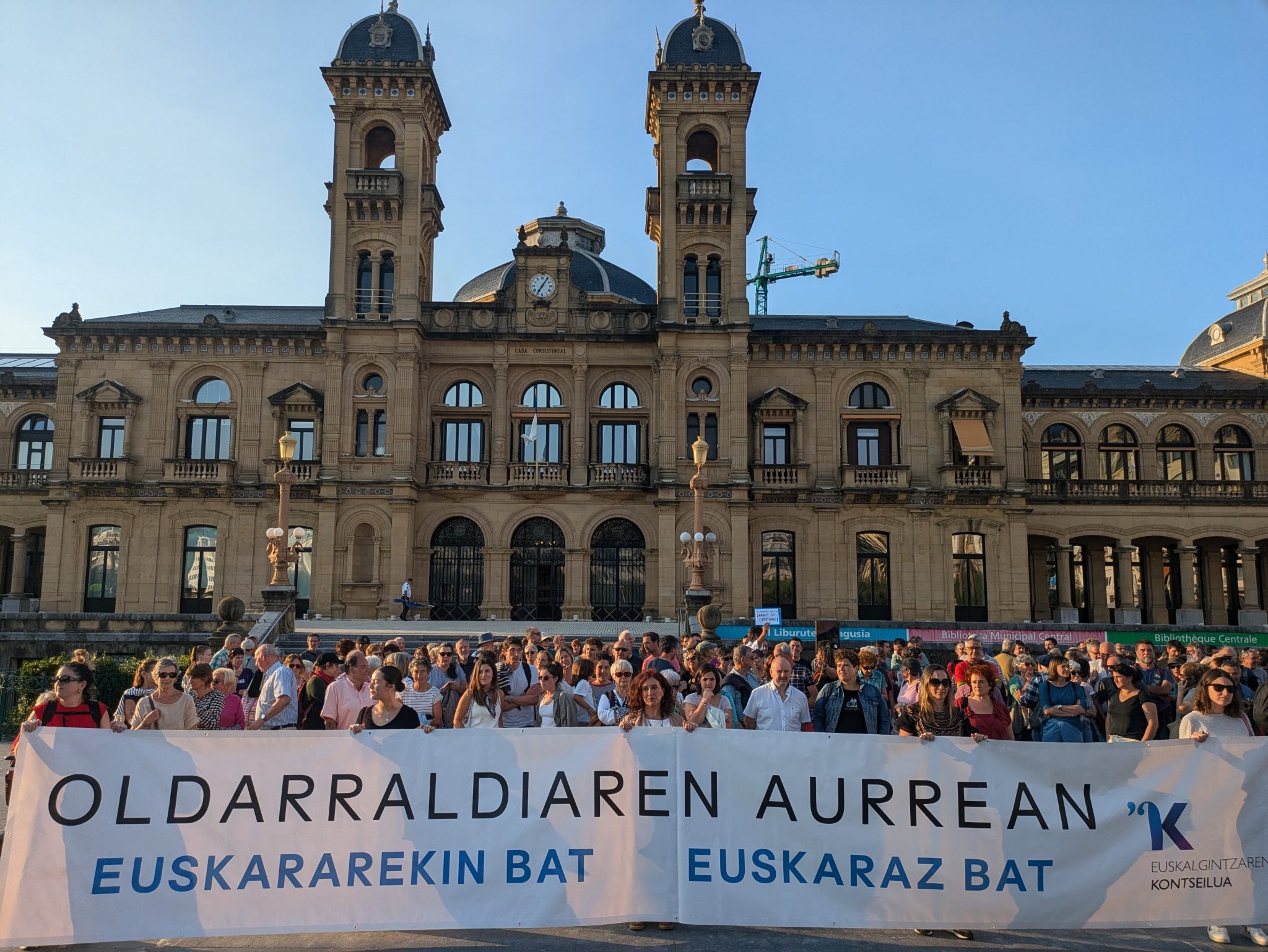

.jpg)
